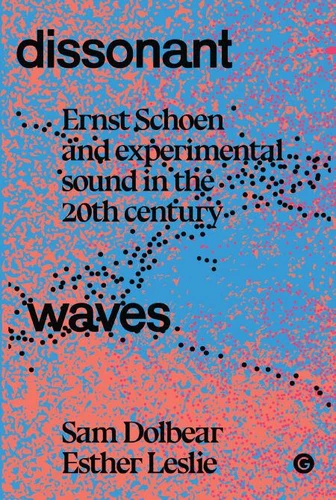Dissonant Waves. Ernst Schoen and Experimental Sound in the 20th century
Par :Formats :
Disponible dans votre compte client Decitre ou Furet du Nord dès validation de votre commande. Le format ePub protégé est :
- Compatible avec une lecture sur My Vivlio (smartphone, tablette, ordinateur)
- Compatible avec une lecture sur liseuses Vivlio
- Pour les liseuses autres que Vivlio, vous devez utiliser le logiciel Adobe Digital Edition. Non compatible avec la lecture sur les liseuses Kindle, Remarkable et Sony
- Non compatible avec un achat hors France métropolitaine
 , qui est-ce ?
, qui est-ce ?Notre partenaire de plateforme de lecture numérique où vous retrouverez l'ensemble de vos ebooks gratuitement
Pour en savoir plus sur nos ebooks, consultez notre aide en ligne ici
- Nombre de pages320
- FormatePub
- ISBN978-1-913380-55-7
- EAN9781913380557
- Date de parution19/09/2023
- Protection num.Adobe DRM
- Taille4 Mo
- Infos supplémentairesepub
- ÉditeurGoldsmiths Press
Résumé
An investigation of the cultures and technologies of early radio and how a generation of cultural operators-with Schoen at the center-addressed crisis and adversity. Dials, knobs, microphones, clocks; heads, hands, breath, voices. Ernst Schoen joined Frankfurt Radio in the 1920s as programmer and accelerated the potentials of this collision of bodies and technologies. As with others of his generation, Schoen experienced crisis after crisis, from the violence of war, the suicide of friends, economic collapse, and a brief episode of permitted experimentalism under the Weimar Republic for those who would foster aesthetic, technical, and political revolution.
The counterreaction was Nazism-and Schoen and his milieux fell victim to it, found ways out of it, or hit against it with all their might. Dissonant Waves tracks the life of Ernst Schoen-poet, composer, radio programmer, theorist, and best friend of Walter Benjamin from childhood-as he moves between Frankfurt, Berlin, Paris, and London. It casts radio history and practice into concrete spaces, into networks of friends and institutions, into political exigencies and domestic plights, and into broader aesthetic discussions of the politicization of art and the aestheticization of politics.
Through friendship and comradeship, a position in state-backed radio, imprisonment, exile, networking in a new country, re-emigration, ill-treatment, neglect, Schoen suffers the century and articulates its broken promises. An exploration of the ripples of radio waves, the circuits of experimentation and friendship, and the proposals that half-found a route into the world-and might yet spark political-technical experimentation.
The counterreaction was Nazism-and Schoen and his milieux fell victim to it, found ways out of it, or hit against it with all their might. Dissonant Waves tracks the life of Ernst Schoen-poet, composer, radio programmer, theorist, and best friend of Walter Benjamin from childhood-as he moves between Frankfurt, Berlin, Paris, and London. It casts radio history and practice into concrete spaces, into networks of friends and institutions, into political exigencies and domestic plights, and into broader aesthetic discussions of the politicization of art and the aestheticization of politics.
Through friendship and comradeship, a position in state-backed radio, imprisonment, exile, networking in a new country, re-emigration, ill-treatment, neglect, Schoen suffers the century and articulates its broken promises. An exploration of the ripples of radio waves, the circuits of experimentation and friendship, and the proposals that half-found a route into the world-and might yet spark political-technical experimentation.
An investigation of the cultures and technologies of early radio and how a generation of cultural operators-with Schoen at the center-addressed crisis and adversity. Dials, knobs, microphones, clocks; heads, hands, breath, voices. Ernst Schoen joined Frankfurt Radio in the 1920s as programmer and accelerated the potentials of this collision of bodies and technologies. As with others of his generation, Schoen experienced crisis after crisis, from the violence of war, the suicide of friends, economic collapse, and a brief episode of permitted experimentalism under the Weimar Republic for those who would foster aesthetic, technical, and political revolution.
The counterreaction was Nazism-and Schoen and his milieux fell victim to it, found ways out of it, or hit against it with all their might. Dissonant Waves tracks the life of Ernst Schoen-poet, composer, radio programmer, theorist, and best friend of Walter Benjamin from childhood-as he moves between Frankfurt, Berlin, Paris, and London. It casts radio history and practice into concrete spaces, into networks of friends and institutions, into political exigencies and domestic plights, and into broader aesthetic discussions of the politicization of art and the aestheticization of politics.
Through friendship and comradeship, a position in state-backed radio, imprisonment, exile, networking in a new country, re-emigration, ill-treatment, neglect, Schoen suffers the century and articulates its broken promises. An exploration of the ripples of radio waves, the circuits of experimentation and friendship, and the proposals that half-found a route into the world-and might yet spark political-technical experimentation.
The counterreaction was Nazism-and Schoen and his milieux fell victim to it, found ways out of it, or hit against it with all their might. Dissonant Waves tracks the life of Ernst Schoen-poet, composer, radio programmer, theorist, and best friend of Walter Benjamin from childhood-as he moves between Frankfurt, Berlin, Paris, and London. It casts radio history and practice into concrete spaces, into networks of friends and institutions, into political exigencies and domestic plights, and into broader aesthetic discussions of the politicization of art and the aestheticization of politics.
Through friendship and comradeship, a position in state-backed radio, imprisonment, exile, networking in a new country, re-emigration, ill-treatment, neglect, Schoen suffers the century and articulates its broken promises. An exploration of the ripples of radio waves, the circuits of experimentation and friendship, and the proposals that half-found a route into the world-and might yet spark political-technical experimentation.




